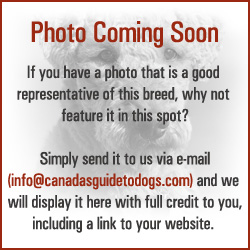
Pointer
Group: Sporting Group
Origin: Great Britain
Height:
Average male height is 25 to 28 inches (64-71 cm) at the shoulder.
Average female height is 23 to 26 inches (59-66 cm) at the shoulder.
Weight:
Average male weight is 55 to 75 lbs (25-34 kg).
Average female weight is 45 to 65 lbs (20.5-29.5 kg).

CLICK HERE to View Breeder Listings
Breed Profile
The Pointer originated in Spain where he was known as the Spanish Pointer. These dogs were far heavier than the Pointers of today. After their arrival in England around 1700, they were crossed with Italian Pointers which produced the Pointer as he is known today. Pointers in North America can be traced back to the Civil War period. Named for the work he does — pointing game for the hunter — he has always been a hard-driving hunting dog and a top contender in field trials.
The Pointer has an even temperament, is alert and dignified, loyal and devoted. He is gentle with children, an excellent watchdog always ready to protect his home and family, making him a wonderful companion both in the home and in the field. Primarily bred for field sport, he requires plenty of exercise and is not a breed recommended for apartment living.
A very versatile breed, the Pointer is seen in the Show ring, in Obedience, Agility, and Flyfall competitions, as well as in Field and Retriever Trials.
The Pointer’s appearance is one of agility, grace and pride with an intelligent and alert expression. His coat is short, dense and smooth with a healthy sheen. Most often seen in liver, lemon, black or orange, ususally in combination with white or solid in colour.
Health Issues
If you are considering the adoption of a Pointer puppy, or any breed, it is very important to be selective in choosing a responsible and reputable breeder. Ensure that the prospective puppy’s parents have all health clearances. Breeding of any dog should not be done until after they have been proven to be free of evidence of significant hereditary diseases. (For more information on selecting a breeder, see the articles on the main General Information page.)
Additional Health Resources:
- Health and Nutrition — Growing section of the Canada’s Guide to Dogs website which includes information on several health and nutrition related issues.
- Canine Health Information Center (CHIC) — Providing a source of health information for owners, breeders, and scientists that will assist in breeding healthy dogs. CHIC is a centralized canine health database jointly sponsored by the AKC/Canine Health Foundation (AKC/CHF) and the Orthopedic Foundation for Animals (OFA).
- AKC Canine Health Foundation — Working towards developing scientific advances in canine health.
- Canine Eye Registration Foundation (CERF)
- Orthopedic Foundation for Animals (OFA)
- Ontario Veterinary College (OVC)
- University of Pennsylvania Hip Improvement Program (PennHip)
- HealthGene — HealthGene Corporation is the leading provider of veterinary DNA diagnostic services in Canada.
- Labgenvet — Laboratory of Veterinary Genetics is a Canadian diagnostic laboratory that offers a comprehensive service of DNA tests for veterinary genetic diseases.
Grooming Information
- Grooming — This section of the Canada’s Guide to Dogs website includes tips, articles and information covering all aspects of dog grooming along with a listing of Groomers from across Canada.
Training Resources
- Training — For training information, see this growing section of the Canada’s Guide to Dogs website for tips, articles, as well as listings of training centres across Canada.
Additional Information
- Clubs, Sports & Activities — For information on the many sports and activities you can get involved in with your dog.
- Working Dogs — The Working Dogs section of the Canada’s Guide to Dogs website provides information and listings of organizations that are involved in various dog jobs, such as Guide Dogs, Therapy Dogs, Police Dogs, Protection Dogs, and much more.
*NOTE 1: CHIC – The Canine Health Information Center “is a database of consolidated health screening results from multiple sources. Co-sponsored by the Orthopedic Foundation for Animals (OFA) and the American Kennel Club (AKC) Canine Health Foundation, CHIC works with parent clubs to identify health screening protocols appropriate for individual breeds. Dogs tested in accordance with the parent club established requirements, that have their results registered and made available in the public domain are issued CHIC numbers.” To learn more, visit: www.caninehealthinfo.org
*NOTE 2: The Fédération Cynologique International (FCI) is the World Canine Organization, which includes 91 members and contract partners (one member per country) that each issue their own pedigrees and train their own judges. The FCI recognizes 344 breeds, with each being the “property” of a specific country. The “owner” countries write the standards of these breeds in co-operation with the Standards and Scientific Commissions of the FCI, and the translation and updating are carried out by the FCI. The FCI is not a breed registry nor does it issue pedigrees.
Quick Links
Get In Touch
- Email: canadasguidetodogs@gmail.com
- Email: info@canadasguidetodogs.com
- Visit us on Facebook: www.facebook.com/CanadasGuideToDogs
— CanadasGuideToDogs.com is an Amazon Associate as well as a participant in various affiliate programs, as such fees are earned from qualifying purchases.

